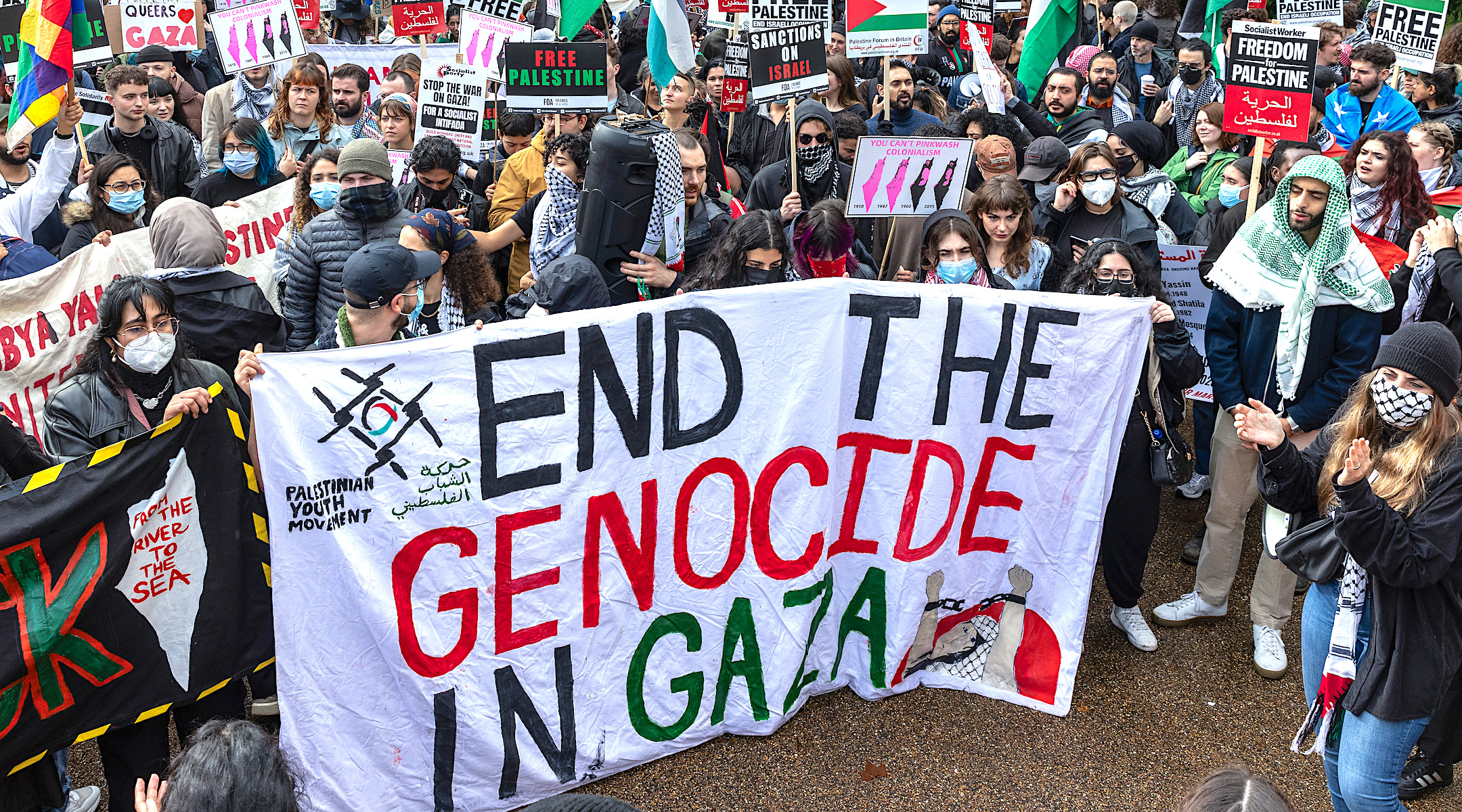(JTA) — Up in Broome County, New York, beneath a simple marker in a family plot in Hale Eddy Cemetery, I believe the Rev. Dr. Franklin Hamlin Littell is turning in his grave.
Littell, the son of a Methodist minister who also became one, was a towering figure in the study of the Holocaust and genocide. In postwar West Germany, he spent almost a decade as chief Protestant religious adviser to the High Commission on Germany, assigned to denazification. In 1958 at Emory University in Atlanta, he initiated the first U.S. graduate seminar on the Holocaust. Eighteen years later in Philadelphia, as chair of Temple University’s religion department, he started the world’s first doctoral program in Holocaust studies. And in 1998 at Stockton University in Pomona, New Jersey, he and his wife, Marcia Sachs Littell, established the first interdisciplinary master’s program in Holocaust and genocide studies.
My late mother, Halina Wind Preston, a Jewish educator who survived 14 months hiding from the Nazis in the sewers of Lviv, was a frequent attendee at an annual Holocaust scholars’ conference cofounded by Littell. I knew Littell, who died in 2009, and at his invitation in 2000 I traveled from Atlanta, where I was a senior editor at CNN.com, to speak on “Professional Ethics After Auschwitz” at the 30th conference in Philadelphia.
So I can imagine Littell’s revulsion if he knew that the word “genocide” was being misused against Israel by scholars and activists — including an Israeli historian who now directs the Stockton program he started.
As Israel retaliates in the wake of the bloody rampage of Oct. 7 — in which Hamas killed 1,500 Israelis, including 260 people at a music festival and hundreds of civilians in nearby communities, and took more than 200 hostages — Raz Segal, the Israeli historian who directs the Master of Arts in Holocaust and Genocide Studies program at Stockton University, has been attracting worldwide attention by blaming the victims.
On Oct. 18, at a vigil on the University of Pennsylvania campus, Segal called President Joe Biden’s visit to Israel “support for Israel’s genocidal assault on Gaza.” On Oct. 13, Jewish Currents published “A Textbook Case of Genocide,” in which Segal wrote that “Israel’s genocidal assault on Gaza is quite explicit, open, and unashamed” and that “Israel’s goal is to destroy the Palestinians of Gaza.”
Segal is far from a lone voice accusing Israel of genocide. At Penn, a student group that organized a rally Oct. 16 said it “unequivocally stands with Palestine in the face of ongoing genocide committed by the Israeli government, which has been assisted by other Western allies like the United States.” On Oct. 24 in Washington, D.C., students at George Washington University projected the message “Divestment from Zionist Genocide Now” onto a library facade.
And on Tuesday, Craig Mokhiber, director in the New York office of the United Nations High Commissioner of Human Rights, resigned, citing Israel for a “textbook case of genocide.”
Littell understood that “genocide” was coined in 1944 by a Polish Jewish lawyer named Raphael Lemkin to denote “the destruction of a nation or of an ethnic group.” Lemkin wrote that genocide is intended “to signify a coordinated plan of different actions aiming at the destruction of essential foundations of the life of national groups, with the aim of annihilating the groups themselves. ”
Historian Michael Berenbaum, distinguished professor of Jewish studies at American Jewish University in Los Angeles, said that Israel has no greater ambition than to coexist with the Palestinians as peaceful neighbors and that Littell would be appalled at the suggestion that Israel was committing genocide in its attempts to root out the fighters and sever the leadership of a group that killed and kidnapped Israelis.
“I knew and worked with and deeply respected Franklin Littell for the last 40 years of his life,” Berenbaum, who was a visiting distinguished professor at Stockton under Littell, told me. “These statements would be anathema to his values.”
Richard Libowitz, coauthor with Marcia Sachs Littell and Dennis B. Klein of “The Genocidal Mind,” agreed that the Israeli incursion does not constitute genocide.
Israel “has never advocated nor sought the total annihilation of an Arab population, whether in Israel proper, the West Bank or Gaza,” said Libowitz, who received a Ph.D. in religion under Franklin Littell at Temple and is retired from the faculties of Temple and St. Joseph’s University.
Indeed, since Israel’s founding in 1948, the Palestinian population in what now includes Israel, the West Bank and Gaza has risen from 1.4 million to 6.6 million, including 1.6 million Palestinian citizens of Israel.
Libowitz acknowledged the ferocity of the Israeli military strikes on Gaza in the wake of the Oct. 7 attacks, as the Palestinian death toll as reported by the Hamas-run health ministry rose above 9,000.
“Civilian casualties in Gaza — especially the death of children — are tragic,” said Libowitz. “Hamas carried out the worst murder of Jews since the Holocaust and the outrage should be understood. Israel intends to destroy Hamas, but Magen David Adom [the Israeli Red Cross] personnel treated wounded terrorists after their attack. Gazans were warned to flee the northern part of the strip. This is human tragedy, but it is not genocide.”
He added: “The stated aim of Hamas — to wipe Israel from the Earth — is certainly a genocidal intent.”
Polly Zavadivker, an assistant professor of history at the University of Delaware, told me that Segal’s statements on genocide “threaten future attempts to identify, prevent, and prosecute that crime. It is equally damaging to the legitimacy of Holocaust and Genocide Studies as a field when such false claims are presented in the guise of scholarly expertise.”
Zavadivker, who teaches courses in antisemitism, the Holocaust, and comparative genocide, said that an accusation that Israel is committing genocide “renders the word meaningless.”
In 1973, after working on it for four years, Franklin Littell and 17 other Christian theologians released a 14-point statement on Israel. The statement, which appeared as an appendix in Littell’s book, seems strikingly relevant 50 years later.
“The charge is sometimes made that Israel is belligerently expansionistic as a result of its military triumphs in the Six-Day War,” it said in part. “Visitors to Israel, however, can easily discover that the overriding concern of the majority of Israelis is peace, not more territory. Israel’s anxiety about national defense reflects the age-old human yearning for security, the anxiety of a people whose history has been a saga of frightful persecution, climaxed by the Holocaust of six million men, women, and children.
“Against such a tormented background, is it surprising that the Jewish people should want to defend themselves?” they continued. “Criticism that would use the failure of Israel to live up to the highest moral standards as an excuse to deny its right to exist … would be a double standard, one not applied to any other nation on earth.”
JTA has documented Jewish history in real-time for over a century. Keep our journalism strong by joining us in supporting independent, award-winning reporting.







